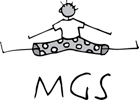It is fairly common knowledge nowadays that Pilates is an exercise regime originally invented by Joseph Pilates back in the 1920’s and 30’s. He was originally a circus performer, boxer and self defence instructor and together with his wife started to develop a series of ex’s designed to create harmonious muscle balance and good health through stretching and strengthening. It became very popular with Dancers, especially ballet requiring excellent flexibility through lots of range of motions yet also needing the strength and stability to avoid injury.
Pilates Matwork or Floorwork often describes classes which do exercises on the floor , using Yoga mats and various props such as foam rollers , exercise balls and resistance bands to challenge certain movements and postural imblances. These can be an effective exercise and are often taught implementing a combination of yoga style stretches and core strengthening postures and positions. Sometimes floor based classes are a bit more challenging to the elderly patient, or those post operative patients having difficulties getting themselves up and down from the floor.
Then you may notice some gyms or training studio’s offering Reformer Pilates or sometimes referred to as Studio Pilates. This involves exercise regimes having similar goals to lengthen tight muscles while sometimes at the same time strengthening weak muscles. These classes utilize specialized Pilates Reformer equipment, which use a series of spring loaded gliding actions, and a vast array of positions to either assist movement, or alternately resist movement for those patients needing to be challenged more. One can sometimes find fairly large groups of 6-15 reformers with one Instructor taking the entire group through the same set of exercises and movements.
Clinical Pilates utilizes similar equipment, yet the difference is that often it is a qualified Physiotherapist teaching either individual patients, or a small group of 2-4 patients at the one time. Each patient is usually given a series of exercises tailored to their specific injury needs, or aimed to target postural imbalances that have been identified by the treating Physiotherapist or Clinical Pilates Therapists pre-class assessment. At MGS , patients undertake a thorough one hour assessment and one on one introduction before commencing the Group Classes. This allows the exercises to be tailored more accurately and risk of injury or re-aggravation of a condition to be markedly reduced due to the close supervision of techniques and form.
Group sessions are ideal for rehabilitation of lower back and discogenic injuries, any type of mid back or neck and postural related conditions. It is safe to do controlled Clinical Pilates during pregnancy and even more so after having babies, to gently restore some strength and stability around the pelvis and core of mums. Contrary to what some people believe, Clinical Pilates is becoming very popular for men, both young and old either trying to recover from an injury or surgery, up to the elite Tri-athletes and active runners trying to get the most out of their performance.
MGS Physiotherapy Exercise therapists are fully trained in the use of Clinical Pilates, and they use these skill sets in combination with many other types of rehab ex’s, core strength and functional strength combinations to guide their Group Patients safely through their programs, whilst challenging even then more elite fitness levels wanting to just improve further and prevent injury and improve their postural control. MGS Physiotherapists have undertaken further study how to specifically use the Pilates Equipment to help fix movement problems and take into account current pain and symptoms of the patient. A reformer is very helpful as it gives the patient feedback (we call this proprioception) to their brain during specific exercises and movements. Injury or pain disrupt this ability to develop and use this feedback, and it has been proven over and over that restoring this proprioceptive feedback ability results in less pain, better core setting and enables more thorough and advanced strengthening of both the endurance and power muscles.
At MGS we like to refer to our classes as “Patient Centred Exercise Prescription” as it utilises not only Pilates principles in helping patients improve function for a better quality of life, but even more importantly, avoid a recurrence of the injury which brought them to us in the first place.
